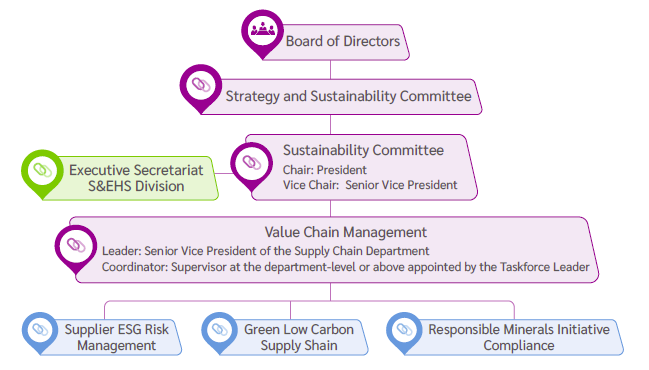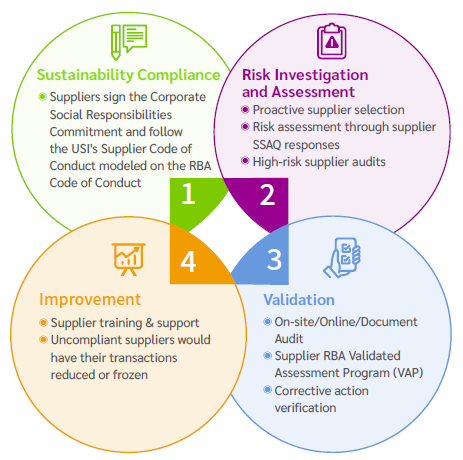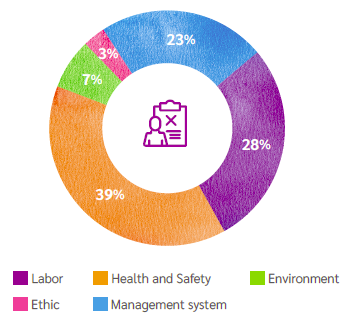
Value Chain Management
Sustainable Supply Chain
With the UN's advocacy and worldwide trend in supply chain management, suppliers are expected to meet environmental, social, and governance standards in addition to quality, delivery, and cost to create sustainable value with partners across the value chain.
USI’s Supplier ESG Programs are executed and overseen by the Strategy and Sustainability Committee, led by the Chair under authorization from the Board of Directors. This structure ensures Board-level supervision, alignment of company policies and implementation, and continuous improvement to achieve long-term goals. In addition, the Sustainability Committee also track and review the performance of supply chain sustainability indicators on a semi-annual basis.

We conduct regular evaluations of our suppliers and invite selected partners to participate in our quarterly Executive Business Review meetings based on performance results. Using a scorecard approach, suppliers are assessed across four key dimensions: pricing, delivery and responsiveness, quality, and ESG. These meetings serve as a platform to communicate our sustainability policies and ESG strategies, exchange market insights, and share best practices.
In 2024 we trained 100% of our internal procurement staff and other employees in sustainability knowledge and awareness, with a total of 3,059 employees participating 1,045 hours in the training sessions, to ensure that they understand the Company's Supplier ESG Program and instill ESG principles and knowledge into each employee's role and implement their daily operations. USI are committed to driving sustainability improvements throughout the supply chain to reduce overall risk.
To properly assess the sustainability risk of suppliers and ensure they comply with USI's Supplier Code of Conduct, USI suppliers are required to sign a commitment to follow the Code and respond to USI's sustainability risk assessment questionnaire based on the RBA Code of Conduct framework, which covers five aspects: labor rights, health and safety, environmental protection, sustainability and risk management, and supply chain management. These supplier risk assessments ensure their risks can be effectively reduced and controlled. On-site audits are conducted for suppliers that may have higher risks to gain a deeper understanding of their sustainability development status, implement effective supplier management, reduce risks, improve the overall efficiency of the supply chain, and strengthen the sustainable development of the supply chain.
Sustainability Risk Assessment Process:

Before conducting risk assessment of suppliers, USI must first proactively conduct supplier screening. The company selects suppliers to be included in control by annual procurement amount and identifies suppliers with potentially high risks in terms of governance, environment and social as the basis for key management.
Supplier Screening:
| Methodology for Suppliers Screening | |||
|
We proactively review and investigate all suppliers' countries/regions, their production processes, and their respective product categories to conduct preliminary assessments of suppliers and analyze potential risks.
|
|||
|---|---|---|---|
| Aspects of Suppliers Screening | |||
| Environmental | Social | Governance | Business Relevance |
|
|
|
|
To enhance overall supply chain competitiveness and ensure suppliers fulfill their corporate social responsibilities, we conduct written evaluations and on-site audits/inspections of suppliers through the SSAQ. A survey of 469 Tier 1 Suppliers was conducted in 2024, with a recovery rate of 76%. The evaluation results over the years are shown in the table below. We analyzed suppliers' SSAQ responses, reviewed and assessed high-risk suppliers, and initiated audits. In 2024, we conducted on-site/document audits for 67 raw material suppliers. For deficiencies found during the audits, suppliers are required to submit improvement plans and must implement them within a specific timeframe and undergo re-audit. Closure rates for re-audits were 100%, and the audit results were classified as low-risk. No supplier relationships were terminated.
Supplier Sustainability Risk Assessment:
| Year | Unit | 2021 | 2022 | 2023 | 2024 |
|---|---|---|---|---|---|
| Number of suppliers evaluated with sustainability metrics | - | 419 | 525 | 456 | 469 |
|
Percentage of suppliers that completed Supplier Sustainability Assessment Questionnaire
|
% | 73 | 73 | 76 | 76 |
| Number of suppliers on-site audited with sustainability metrics | - | 47 | 46 | 65 | 67 |
We analyzed the deficiency items in supplier audits and found that of the five major areas, 39% were health and safety. The detailed results are shown in the chart below. USI will continue to support and guide our suppliers to align with the RBA Code of Conduct, working together to improve and advance the supply chain operating environment.
Distribution of Supplier Sustainability Audit Findings:

USI conducts supplier human rights risk assessments to understand the importance of human rights issues in the supply chain. The results of suppliers found that "Human Rights Policy and Commitment, Non-Discrimination/Non-Harassment/Humane Treatment, Occupational Health and Safety, and Industrial Hygiene" as the main human rights risk issues. We also identified high-risk suppliers and took corresponding measures to continuously track the effectiveness of their corrective actions.
Supplier Human Rights Incident Mitigation and Remediation Measures:
- Mitigation Measure
- Annual audits and RBA VAP to assess suppliers’ human rights risks through each facility to avoid risks.
- Requiring suppliers to adopt corrective measures for human rights risks and conduct follow-up on implementation.
- Instilling the importance of human rights in supplier labor through education and training on sustainable supply chains to reduce risks in advance.
- Remediation Measure
- Suppliers with public human rights commitments were given positive evaluations to enhance overall supplier performance. Those without public commitments were classified as high-risk suppliers and subject to strengthened training and audits.
- Requiring suppliers to provide guidance or compensation, or to implement policy changes or other measures for employees whose human rights have been violated.
- If a high-risk supplier is identified, the Company shall conduct on-site audits and provide recommendations for improvement and require the vendor to submit improvement reports on a regular basis to track the performance of continuous improvement.
USI considers suppliers as key partners and attaches great importance to communication and interaction with them. Through supplier education and training, presentations, and technical/competency counseling, USI empowers suppliers to develop an awareness of sustainability management to meet the ever-changing trends and enhance the overall sustainability of the supply chain.
- Sustainable Supply Chain Training
- Supporting Suppliers with Improvement Actions
- Supplier Carbon Mentoring Program
- Innovative Application Project


